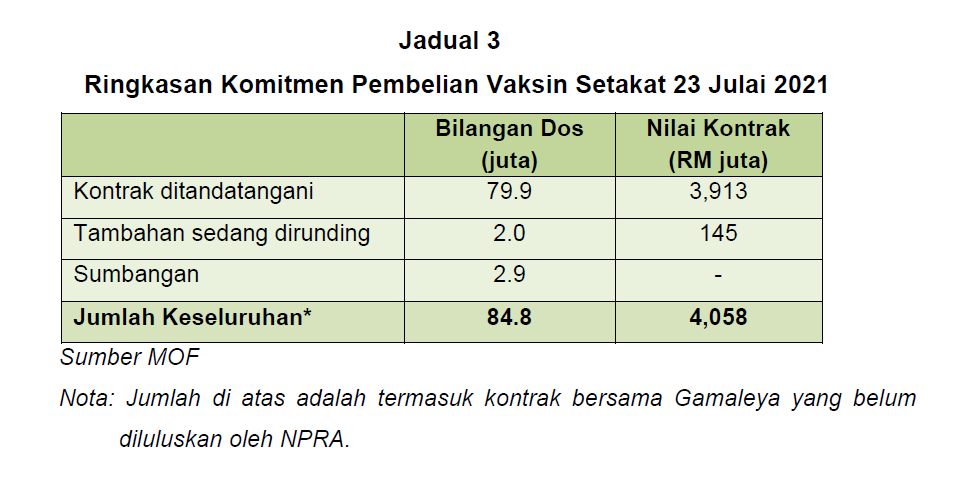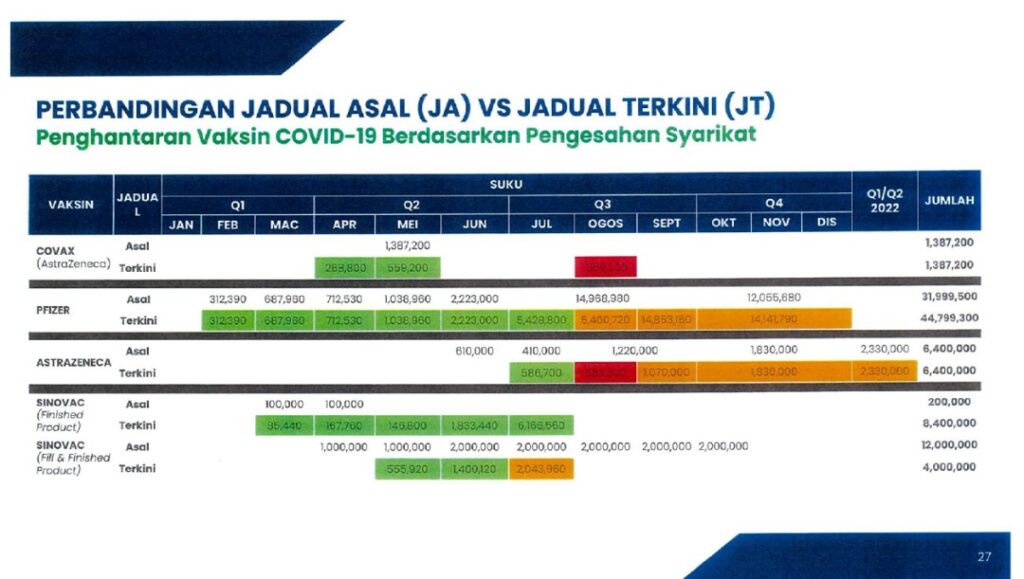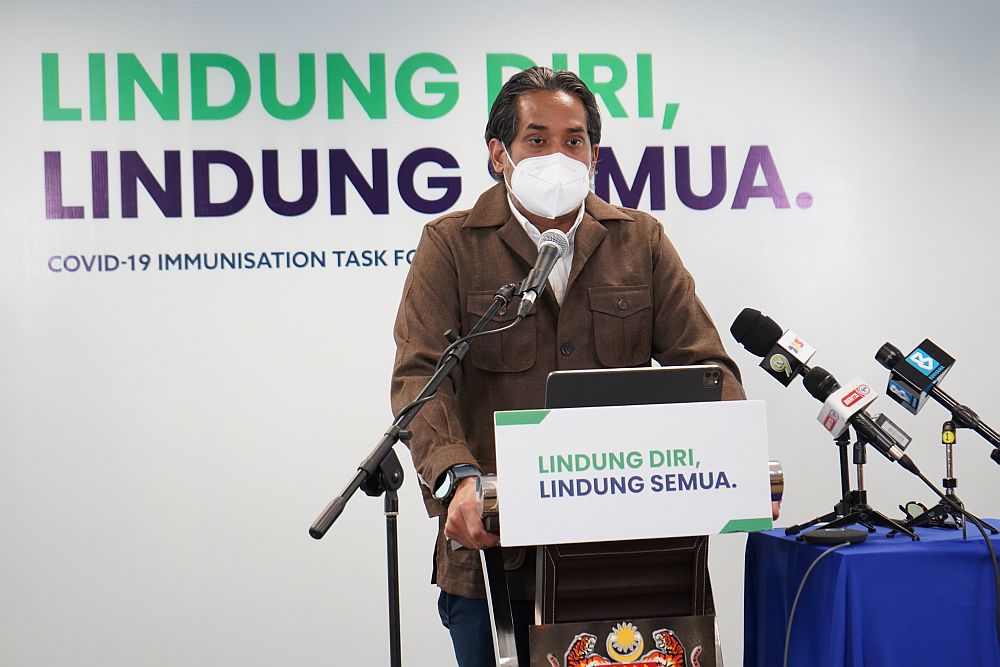KUALA LUMPUR, Dec 3 — The Malaysian government paid about RM77.35 per person on average for two Covid-19 vaccine doses, based on RM2.05 billion initially allocated to procure coronavirus shots for 82.8 per cent of the population, or 26.5 million people.
Then-Vaccine Minister Khairy Jamaluddin told Parliament’s Public Accounts Committee (PAC), in a meeting on January 5, that Malaysia’s vaccine price per person is lower than the amount spent by Belgium at RM82.40 per person for the latter’s population of 16.75 million, based on prices leaked by a Belgian minister in December last year.
“If we make a rough calculation — this is just for your information — RM2.05 billion divided by 26.5 million, that comes to a blended price of RM77.35 per person for Malaysia. The Belgium one was RM1.38 billion over 16.75 million, which is RM82.40 per person. So, ours is cheaper.
“This is per person, not per dose. We are assuming times two doses. So, Malaysia is at RM77 per person, Belgium is at RM82 per person — that was the leaked amount,” Khairy said, according to transcripts of the meeting published in the PAC’s Covid-19 Vaccine Procurement report tabled in Parliament on Monday.
The government in April announced that the allocation had been increased to RM3.5 billion to cover the purchase of booster shots and vaccines for adolescents below the age of 18.
It was later raised further to RM3.9 billion with an additional RM400 million allocated for vaccine purchase under the Pemulih package announced in June. This was attributed to the additional procurement of 12.8 million Pfizer vaccine doses to address shortage issues after Gamaleya’s Sputnik V coronavirus vaccine failed to get regulatory approval on time.
However, according to the PAC report, Malaysia’s overall contract value for Covid-19 vaccine procurement has hit RM4.1 billion for 84.8 million doses, including donations of 2.9 million doses from other countries, when the government made an additional order of two million Sinovac Covid-19 vaccine doses, after Pfizer failed to deliver the amount scheduled as planned by the Covid-19 Immunisation Task Force (CITF).

Khairy, in another meeting with the PAC on July 27, told the committee that the “unpredictable” vaccine delivery schedules also resulted in delays in the issuance of vaccine appointments when the national vaccine campaign was initially rolled out.
“Well, I mean logically, when Pfizer commits to 25 million (doses) over the third quarter, as a buyer, you want that to be sent in equal portions. But what we’re seeing now is some weeks they will send 1.8 million, other weeks they will send 1.2 million, so that really causes a lot of headaches for us because for us to send out the appointments, we need to first see how many (doses) are being delivered.
“Sinovac was a bit better because we controlled a part of the manufacturing process — there’s the fill-and-finish by Pharmaniaga. Secondly, the delivery schedule for fill-and-finish had been completed and China was quite on time. The only problem there was the inspection lot release from National Pharmaceutical Regulatory Agency (NPRA).
“… I would say that the lack of clarity in the weekly schedule affects the appointment scheduling,” Khairy said, adding that global Covid-19 vaccine inequity was also an issue.
Then Health Minister Dr Adham Baba, in a meeting with the PAC on August 2, said that the Ministry of Health (MOH) — which is responsible for procuring Malaysia’s Covid-19 vaccines — had contacted Pfizer multiple times via video conferencing to make sure that their vaccines are delivered on time.
“They kept giving excuses, as mentioned by the MOH secretary-general, that ‘global supply’ was an issue that is causing delays to their deliveries,” Dr Adham said.

The PAC also raised the issue of using RM5 billion from the National Trust Fund (KWAN) to purchase Covid-19 vaccines and for various other needs to execute the National Covid-19 Immunisation Programme (PICK). KWAN is a savings fund collected from Malaysia’s natural resources, predominantly contributions from oil and gas giant Petronas.
As of July 21, a total of RM1.027 billion had been spent out of the RM5 billion allotted. In a meeting with the PAC on July 28, Finance Minister Tengku Zafrul Aziz said the use of KWAN funds to address an unprecedented crisis also allowed the government “more liquidity” to help people affected by the pandemic.
“If you look at our national debt at the moment, I think we are estimating close to RM1.4 trillion worth of debts and liabilities… our fiscal state is very limited as our debt service ratio will likely hit 20 per cent by 2022 — that is probably at least RM40 billion of just paying interest each year, that’s more than paying for government pensions.
“So, in terms of managing cashflow, that’s why we looked at KWAN because KWAN — by tapping into KWAN — it gives us more liquidity to then help the rakyat. I think this is the time to use KWAN. If this is not the time, it is for the next future and every generation say it is for the future, when is the future generation going to be established? This, like I said, is an unprecedented crisis,” Tengku Zafrul said.
Overall, the PAC was satisfied with the Covid-19 vaccine procurement process. In summary, the PAC said they find the purchase prices covering various brands under the national portfolio to be reasonable.
However, it said the government should have stood its ground and kept the price paid for a portion of Sinovac’s finished product level, instead of paying a premium amount which was an increase of 16.78 per cent to 18.12 per cent from the initial price due to delays by Pharmaniaga in April, May, and June, as well as increased demand for vaccines during the period.
PAC was also satisfied with the coordination between the Ministry of Science, Technology, and Innovation, the MOH, the Ministry of Finance, and other federal agencies involved under PICK.
It also noted that due to the country’s limited financial resources, the government was not able to place a strategic bet on vaccine manufacturers to secure early orders for their vaccines that, at the time, were still undergoing clinical trials.
“This was one of the reasons why Malaysia was not able to obtain the Covid-19 vaccine supplies sooner. The vaccine procurement process became more proactive with the establishment of the Vaccine Supply Access Guarantee Special Committee (JKJAV) on October 2020,” the report read.








